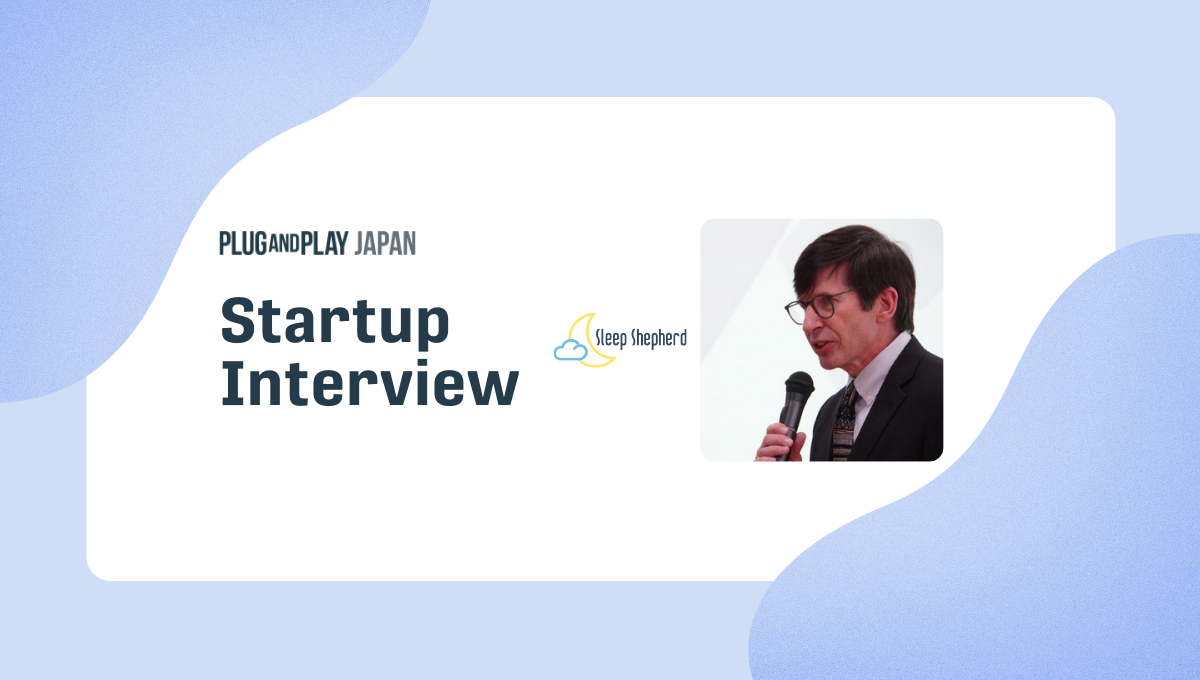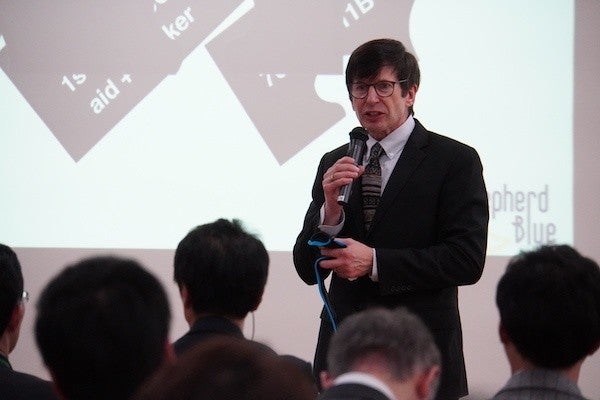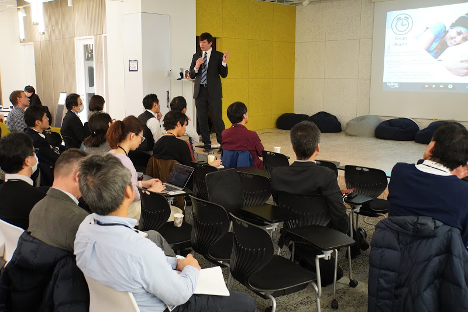Better Sleep for Everyone - Sleep Shepherd
2022/11/28

One of the most focused topic in the health tech industry right now is sleep tech. Most of us do not have enough time to sleep, and even if we do, the quality of sleep is generally very low. Michael Larson, the founder and CEO of Sleep Shepherd, has invented an IoT headwear in order to save his daughter, who is suffering from insomnia. Now, Larson is committing himself with this headwear to improve many other people’s quality of sleep.
Michael Larson Ph.D.
Founder, CEO of Sleep Shepherd
Writer: Chiyo Kamino
Communications Associate, Kyoto
ーー How did you develop the idea of starting Sleep Shepherd?
Before starting Sleep Shepard, I considered the commercialization of a surgical system that uses laser energy to close wounds instead of sutures or staples. However, at that time, my daughter was diagnosed with a sleep disorder, and, unfortunately, the prescribed drugs that were supposed to help her started to harm her body badly.
Because of this side effect, she was sent to an emergency room and had to stay in the hospital for two weeks. This experience made me determined to discover a new technology to help people suffering from severe sleep disorders without relying on a pharmaceutical approach. Since then, I have begun to research to promote ways in which people could fall asleep naturally. As the rate of our brain activity defines sleep, the challenge here is to find a breakthrough approach to encourage one’s brain activity to slow down. I tried some optical methods and discovered the unique auditory stimulation called binaural tones. So the original motivation for me to start a sleep tech company was to help my daughter, but I have also become aware that this technology can help many people suffering from similar sleep disorder symptoms. Therefore, my team focuses on a technological breakthrough in addressing this societal problem.
ーー In your pitch, you explained why sleeping well is so important for your health.
Yes. For a long time, scientists were baffled as to why people need to sleep. It doesn’t make any sense, right? Why should you spend so much of your time being unconscious? But we now know that necessary activities for our bodily functions happen in a deep sleep. The most important of these is that your brain cleans itself during that time*.
<*Studies have shown that cerebrospinal fluid (CSF) washes through your brain during deep sleep to clear out harmful proteins that damage the connections between neurons and are believed to cause Alzheimer’s disease.
ーー Since you started Sleep Shepherd, did you face any challenges?
In practice, Sleep Shepherd is a device, and what many stakeholders say in the product development field is true: “Hardware is hard.”
In addition to developing a technology that works, we must be able to deliver that product at a cost-effective price. We have to undergo extensive testing to ensure that the product is high-quality, and this process undoubtedly requires a long timeline. Because the device runs on software, I must write the embedded firmware and the companion smartphone app. Also, there are challenges with promoting awareness of the product and figuring out adequate distribution channels. These activities require capital before generating revenue from sales. So yes, there were various challenges and obstacles.
ーー I heard you are currently working with Dentsu and Fujikura. Could you tell me more about the details of your project?
Oh, it’s going very well, and it’s fascinating. The collaboration started because Fujikura recognized a need to help their manufacturing workers get better qualities of sleep. They want to do this to improve the quality of life for the employees who are assigned to night-time shifts. At the same time, this effort would boost productivity for these employees, as it is known that workers with low-quality of sleep tend to make more errors than people who get reasonable amounts of sleep.
In reality, the manufacturing industry is highly competitive, and it is impossible to leave machines idle. For this reason, manufacturing firms want to help their employees perform better while coping with rigorous schedules. Fujikura tested various currently available technologies and found that Sleep Shepherd would tackle this task optimally. Thus, we had several meetings, and they conducted a Proof-of-Concept (PoC) project with 84 people using Sleep Shepherd. Researchers at UCLA oversaw the gathered data and concluded that the observants’ quality of sleep was improved to a significant degree, as determined by standard metrics in the sleep medicine field.
Fujikura favors the product and would like to have it available to their workers. At the same time, feedback from their employees has led to design improvements, such as making the fabric headband machine washable. This alteration of the product is a necessary change to optimize Sleep Shepard for the Japanese market. We are working together to implement changes to other features as well. Fortunately, different Plug and Play Kyoto partners, led by Dentsu, also recognize the value of sleep and are confident that Sleep Shepard would become a great product in the Japanese market.

Pitching at Plug and Play Shibuya
ーー This is your first step into the Japanese market. How do you see the progress so far?
While I’m sure it comes as no surprise to you, the company culture is very different when working with a Japanese company compared to one in the US.
In some ways, the differing company culture in Japan is highly pragmatic, such as the clear emphasis on gathering data and utilizing them to produce effective products. But in other ways, their distinct culture makes Japanese firms incompatible with the startup’s need to decide and move swiftly. Because innovation is critical to success, various US companies now allow decision-making at the lower level of the company’s division to ensure speed. A common philosophy now is to “fail early” to succeed sooner. But it has come to my attention that in the Japanese culture -although there is a clear desire to be innovative and entrepreneurial- the large companies are either not ready or unable to move fast in collaborating with Startups. In many cases, these companies make it mandatory to involve countless people from various divisions, even for making a small decision.
One of the remarkable things, though, is the systematic approach of the Japanese companies, where they demonstrate their focus on data and determine whether the products -including Sleep Shepard- are effective. Consequently, the studies show that the technology we use for our sleep devices does help bring people with sleep disorders a better quality of sleep.
Unfortunately, other products on the market claim that they help people fall asleep, but in reality, these products do not contribute to promoting sleep. But they are available on the market, and consumers without sufficient knowledge or those without the available time to assess the validity of the product could purchase them. In this context, the application of Japanese company culture to sleep tech might offer a more favorable outcome in general for the industry. Many of these insufficient sleep tech products have damaged the reputation of sleep technology by failing to meet the expected standard of the consumers. For instance, consumers have tried a wrist tracker or a box on their bedside table to realize that these do nothing to help them sleep and feel better — despite what the advertising says. Even in the cases of sleep-tracking devices, these gadgets only collect data on the amount of sleep the wearer gets. For example, the recorded motion of your wrist does not directly correlate with sleep stages or the quality of sleep.

Pitching at Plug and Play Shibuya
ーー What do you see as the most important thing about running your business?
The company must take bold actions when it comes to businesses that aim to improve people’s quality of life. When I think about what defines an entrepreneur, as opposed to a regular business person, it is being well-versed in managing risks. Entrepreneurship is all about risk. But it’s not just about taking risks, which are unavoidable; promising entrepreneurs know how to mitigate risks. In this context, the essential factor for achieving success as an entrepreneur is understanding your risks and thinking ahead about the various ways things can go wrong. Of course, certain risks arise in any business, but typically you seek those out differently than you must in the entrepreneurial environment.
As I get older, earning money becomes less important than wanting to do something that improves people’s lives and has lasting value. When you focus on this, the money will follow. The Sleep Shepherd allows us to achieve this goal: to do well while doing good.
